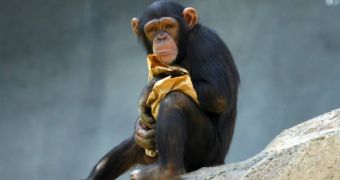It's a well-known fact among zookeepers that members of the Great Apes family, as in gorilla, bonobos, orangutans and chimpanzees, like to be tickled, and that they respond to this form of treatment with squeals and chuckles. After analyzing the noises that the animals make, researchers have come to the conclusion that this method of expressing joy or satisfaction may very well be the evolutionary root of our own laughter. A new study shows that it has evolved in the Great Apes since 10 to 14 million years ago, and that it started doing so before the time of the common ancestors we, as a species, share with the apes.
Psychologist Maria Davila Ross from the University of Hannover in Germany, who is the lead author of the new research, says that “The vocalizations of non-human primates were presumed to be panting and thus dissimilar to human laughter.” Among the main reasons for that were the differences between the two types of behavior. For starters, humans only laugh when they exhale, whereas our counterparts do so while inhaling as well. This issue made anthropologists question whether laughter, as a behavior, originated before the development of humans or came afterwards.
In humans, this behavior is one of tremendous social importance. According to previous researches, we are about 30 times more likely to laugh when we are in the company of others than when we are alone. In addition, studying the roots of the behavior is one of the most important parts of deciphering the origin and developmental course of language. Both require breath control, as well as vocal chords movements, and laughter may have contributed to the development of speech to a great extent.
“Laughter serves as an emotional contagion. It serves as a way of getting everyone on the same page. Secondly, it serves as a way for individuals to inform their social partners about their intentions, as well as provide information and feedback about their own emotional state,” explains Clayton Sate University biologist Jared Taglialatela, quoted by Wired. It has recently been shown, in a scientific paper, that happiness and laughter spread through social networks like ripple in a pond, and that it may take up to a year for the “waves” to reach halfway around the world.
The differences between the Great Apes and humans in terms of laughter “vocalization” may be primarily owed to the fact that anatomical differences between ourselves and them prevent them from making any discernible sounds to speak of. However, the most important advantage we have over the other species is that we laugh also without actually touching each other, as often the play is cognitive or emotional.

 14 DAY TRIAL //
14 DAY TRIAL //